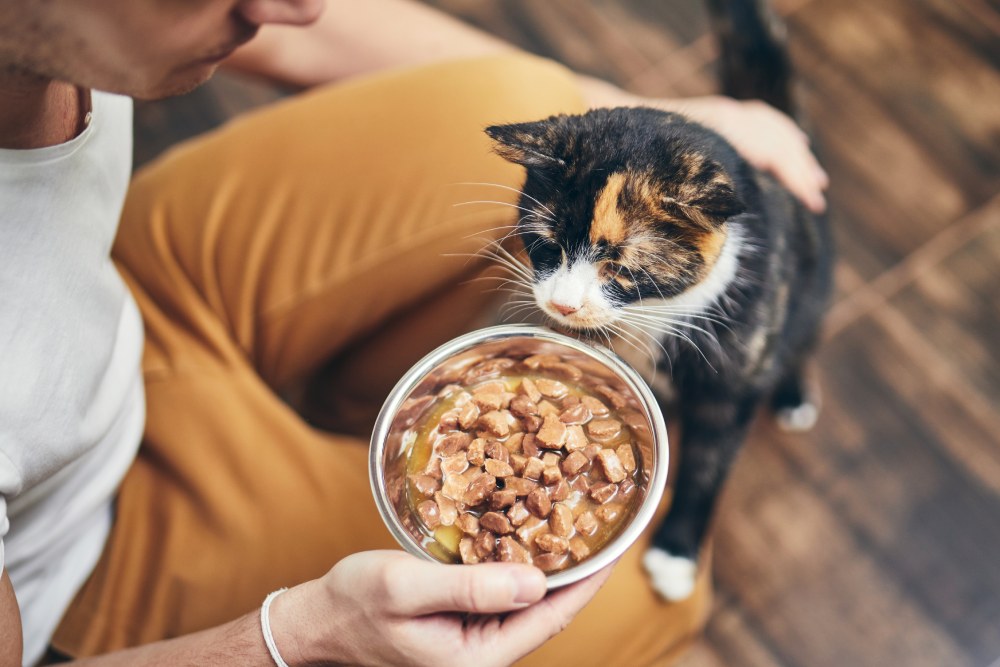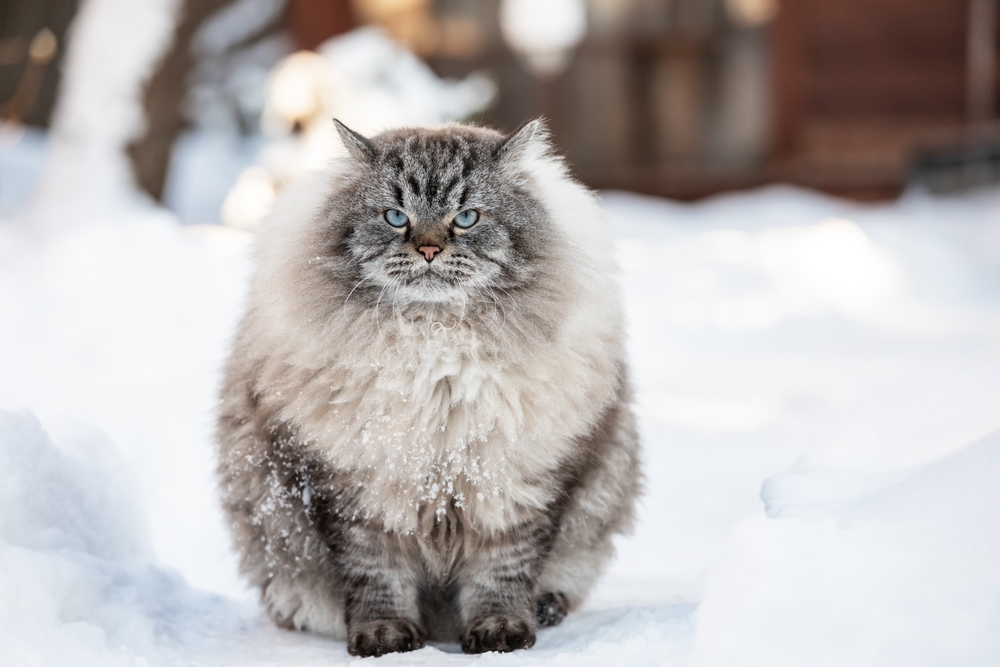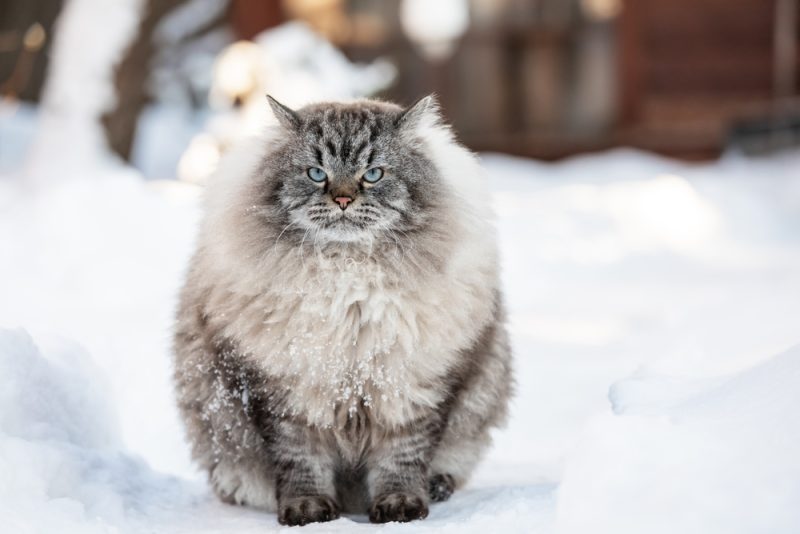Click to Skip Ahead
If you have been a cat owner for several years, you may have noticed your pet occasionally but regularly looking heavier or thinner, and many people wonder if it has to do with the time of year. The short answer is that yes, a cat’s weight can fluctuate with the seasons.
Here, we provide several reasons that your cat’s weight can vary from one season to the next and give you tips on helping your pet maintain an ideal weight so they can be happy and healthy.
Cats Know the Time of Year
Winter
During the winter months, cats tend to get less exercise, especially if they like to go outside. The cold weather will keep them indoors more often, and much of the activity that they would get playing and hunting will need to wait for spring, which can lead to weight gain in some cats. Even indoor cats may move less in winter due to the reduced hours of sunlight and cooler temperatures. They might also be less active because you are less active in winter, as many people like to snuggle on the couch and watch TV when it’s too cold to be outdoors.

Summer
Many cats naturally get more active as the weather warms up. Cats that go outside will spend much of the day hunting and chasing things, and even indoor cats can spend time stalking wildlife through the windows or from the porch, which will keep them active and burning calories. Many cat owners notice their pets sleeping far less in order to get back into the action, and we humans also tend to stay busier, which might also help keep our pets from spending the day sleeping, as they must often be underfoot to see what you are doing. With the added activity during the summer months, your pet will likely shed weight and appear a bit thinner.
Cats Have a Winter Coat
Most cats naturally develop a winter coat each year, which helps protect them from the colder temperatures. You might not notice it just by glancing at your cat because it’s the thick undercoat that they get more of. However, it can give your cat a fuller appearance, which can make you think that they put on a few pounds. In contrast, this undercoat will thin out significantly as the summer approaches, which can make them look thinner and even more muscular. Outdoor cats will often experience a bigger change in coat density from season to season, but indoor cats will also change slightly.
Your Cats’ Diet
One thing that can cause your cat to gain a bit of weight in the winter is their diet. Many cat owners might not know that as it gets cold and your pet spends more time inside sleeping, it can be a good idea to cut back on the number of calories that they are eating, especially in the treat department, since it will be harder for them to burn it off. That said, it can be hard to determine how much to reduce safely, so consult with your vet before making any dramatic changes.

Normal Versus Concerning Weight Changes
While your cat might look different from summer to winter and there may be slight weight changes, anything more than a pound’s difference in either direction calls for an examination by a veterinarian. Significant or rapid weight changes are often a sign of an underlying health problem.
Tips for Maintaining a Cat’s Weight
- Regular vet visits will help you monitor your pet’s weight and learn about any potential health problems early.
- Feed your pet a high-quality commercial cat food with real meat like chicken or turkey listed as the first ingredient. You also want to choose a brand that’s right for your pet’s age, weight, and health condition. If you are not sure what to feed your pet, talk it over with your vet.
- Establish a feeding schedule to have better control over your pet’s portion size, if your cat is prone to overeating.
- Limit treats to no more than 10% of your cat’s total daily caloric intake.
- Resist sharing human food with your pet, as it may contain dangerous ingredients and can lead to weight gain.
- Try to maintain a consistent amount of activity throughout the year. Regularly scheduled playtimes can get your cat into a routine that helps them maintain an ideal body weight year round.

Frequently Asked Questions
Can Outdoor Cats Shed More Weight Than Indoor Cats?
The seasonal weight fluctuations of an outdoor cat may be more significant than those of an indoor cat because the outdoor cat can get significantly more activity as they hunt and escape dangers. The reduced activity during the winter will also be more dramatic.
Why Does My Cat Eat Less in the Summer?
Some cats will eat less in the summer, and it can be due to the warmer temperatures affecting their appetite, or they may be too busy having fun. However, if you start to notice significant weight loss, it’s best to consult with a vet to rule out any underlying health problems.
How Much Seasonal Weight Change Is Normal?
Your cat’s weight should fluctuate only slightly, especially if they stay indoors. It’s best to discuss any significant change of more than a few pounds with a veterinarian.
What Should I Do If My Cat Doesn’t Lose Their Winter Weight?
If your cat puts weight on in the winter and doesn’t lose it in the summer, it’s a good idea to contact your veterinarian about the proper steps that you can take to help them burn it off, which could mean more activity, modifications to their diet, or both.
Summary
Your cat’s weight can fluctuate a bit from season to season, and they will usually be slightly heavier in the winter than they are in the summer, with outdoor cats experiencing a more dramatic change. Reasons likely included changes in activity leading to caloric imbalances. Besides the actual weight gain, cats will often get a winter coat that can fill out their appearance, making them look heavier. However, if you notice a sudden weight change in your cat at any time of the year that is more than a pound, it’s a good idea to schedule an appointment with a vet to rule out any underlying health problems.
Featured Image Credit: Dmitry Naumov, Shutterstock













